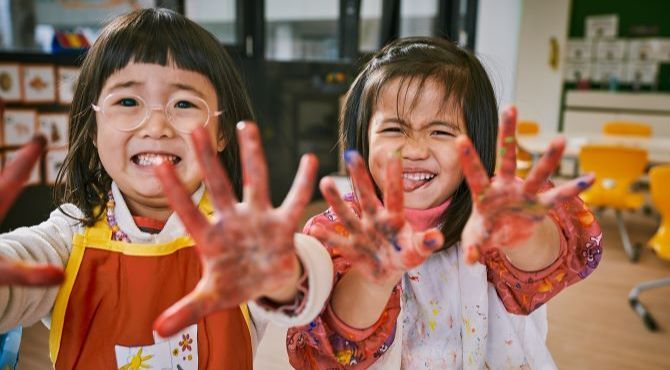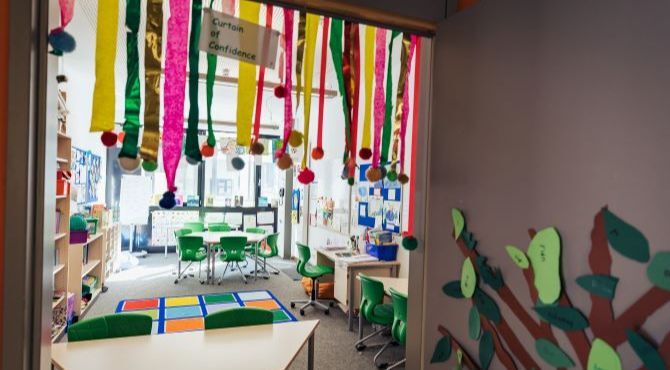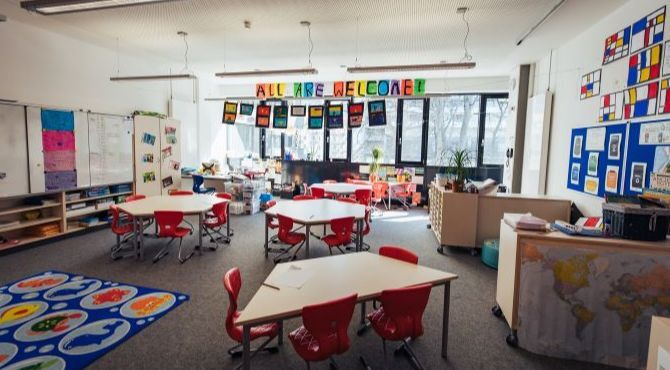Early years education at Bavarian International School (BIS)
Bavarian International School (BIS) explores the importance of early years education across its two campuses.
Bavarian International School (BIS) in Munich-Schwabing, Germany
Owen Murphy, Principal and Nicola Moloney, Vice Principal & PYP Coordinator at BIS City Campus in Munich-Schwabing
Why is early years seen as increasingly important?
Owen Murphy (Principal): From our point of view, this phase of learning is vitally important and always was! Not only is there significant research about the importance of brain development at this stage, plus the fact that concepts and skills learned are so foundational for ongoing educational success, but also the learners are forming themselves as individuals. Through play-based learning, we place a lot of emphasis on the development of interpersonal skills and social-emotional development. Throughout our programme, we invest in ‘Approaches of Learning’ skills which equip our students to be lifelong learners.
Primary Years Programme (PYP)
Nicola Moloney (Vice Principal and Curriculum Coordinator): Early Childhood is part of the Primary Years Programme (PYP). Students enjoy carefully planned open-ended provocations and child-initiated play. Learning through play allows them to have agency: voice, choice and ownership, whilst developing skills (known as the Approaches to Learning), knowledge and understanding. Our learning experiences are authentic, using both the indoor and the outdoor environment. Working collaboratively the individual needs of our students can be met. Our Early Childhood team is highly skilled and committed to providing a rich and engaging educational programme. It provides a strong foundation for future learning.
What parents should look for in an early years setting
Owen Murphy (Principal): Since we believe play-based learning is important, you would see spaces which are deliberately designed for this purpose. I would encourage parents looking at a school to ask themselves whether the learning
environment reflects their philosophy of learning. Also, my other insider tip would be: try to visit a school during the school day. Nothing could possibly be better to see what a typical day looks like. We love to show families around school on a totally
normal school day!
The importance of the physical space for children of this age
Owen Murphy (Principal): It is important to us that our physical space reflects our beliefs about early childhood education. We have a centre-based approach. At City Campus, we have two homeroom-bases for our students and teachers, where they
meet together to start each day. This is their community base, with a circle time meeting area for coming together as a team. These rooms have learning areas for play and exploration. Today, for example, you would see a loft, a kitchen and a
cardboard tree for fantasy play. These areas change regularly thanks to our dedicated teachers. We also have two adjoining rooms which are opened to make a fluid learning environment. These normally focus on sensory learning, with special
lighting and projection options, and arts and crafts. In addition, there is a quiet rest area for students who still nap during the day with mattresses. Outdoors we have a playground with climbing frames, model structures and a mud kitchen which are
perfect for our youngest learners. The ‘bikes and tykes’ recess is especially popular, as are the outdoor learning periods in the timetable.
Bavarian International School (BIS) in Munich and Haimhausen, Germany
Angela Hölzl, Principal and Niko Lewman, Vice Principal & PYP Coordinator Primary School at the Haimhausen Campus of Bavarian International School (BIS)
Why is early years seen as increasingly important?
“Research consistently demonstrates that experiences during the early years (ages 3-6) lay a strong foundation for future social, cognitive, and emotional learning. During this critical period, the brain is highly receptive to new experiences and relationships, shaping a child’s future trajectory.”
Primary Years Programme (PYP)
“Our early years program adheres to the Primary Years Programme (PYP), a comprehensive curriculum framework developed by the International Baccalaureate (IB). The PYP is renowned for its holistic approach, emphasizing the development of the whole child, including cognitive, physical, social, and emotional aspects.Key advantages of the PYP include:
● Transdisciplinary learning: through inquiry-based learning across different
subjects, mirroring how children naturally connect ideas and experiences.
● Learner agency: It empowers students to take ownership of their learning,
cultivating curiosity, creativity, and problem-solving skills.
● International-mindedness: promotes understanding and appreciation of diverse
cultures and perspectives, preparing students to become global citizens.
● Holistic development: It supports the well-being of the whole child, encompassing
social, emotional, and physical dimensions.
What parents should look for in an early years setting
When selecting an early years setting, parents should prioritize the following:
● Quality of care: A nurturing and stimulating environment provided by qualified and
caring educators is paramount.
● Curriculum: A well-designed curriculum should foster holistic development,
inquiry-based learning, and a love of learning.
● Communication: Regular communication with parents is essential to stay informed
about a child’s progress, the program, and opportunities for feedback.
● Safety and well-being: Robust safety policies and procedures are crucial to ensure
a secure and protective environment.
Red flags to be mindful of include:
● Lack of qualified staff
● Poor hygiene and safety practices
● Limited opportunities for play and exploration
● Overemphasis on rote learning and drills
● Negative or unresponsive staff
The importance of the physical space for children of this age
“The physical environment plays a pivotal role in early childhood education. A well-designed space can stimulate learning, creativity, and social interaction. Our early years space is designed to be inviting and comfortable: The space is welcoming and age-appropriate, featuring comfortable seating, natural light, and a variety of learning materials. Each classroom has opportunities for exploration, discovery, and play. We ensure the space is secure and protective, with appropriate safety measures in place, whilst also being flexible to maintain the children’s interest, and to accommodate the needs of different children and activities. At BIS, we also make the most of the outdoor environment and include outdoor learning activities daily. We are blessed to have fun playground areas, a forest on our doorstep, a school garden, and lots of green space to take advantage of.”
Visit the Bavarian International School (BIS) Featured School page









